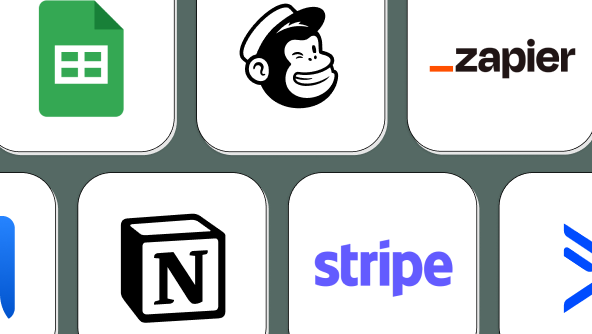
All Solutions

Explore all the solutions you can create with Paperform: surveys, quizzes, tests, payment forms, scheduling forms, and a whole lot more.
See all solutions











Connect with over 2,000 popular apps and software to improve productivity and automate workflows
See all integrationsProducts
Solutions
All Solutions

Explore all the solutions you can create with Paperform: surveys, quizzes, tests, payment forms, scheduling forms, and a whole lot more.
See all solutionsIntegrations

Connect with over 2,000 popular apps and software to improve productivity and automate workflows
See all integrationsResources
20 types of contracts every business should know

Contracts are the linchpins of almost everything we interact with, even if you don’t realise it. Contracts provide safety, security and the ability to fall back on the agreement if an issue arises or a change is needed. From new employment and tenancy to verbal partnerships and handshake deals, we are utilising the benefits of contracts all the time.
Often times, we make these deals without much thought. They aren’t always on legal jargon-filled documents . When it comes to the business side of contracts, though, it’s not just creating the contract, but creating one that suits you, the other party and the meets the necessary obligations of the situation. The right contract is important not just for ease of creation, but for making responsibilities clear, complying with regulations and managing risks for both parties.
With so many different contracts types with dozens of contract clauses within, it can be hard to know which kind of contract you need, why you need it and what elements are required. Luckily, we’ve done that hard part for you.
The Necessity of Various Contract Types
You can get by with a general contract template that can adhere to different contract types, but in a business situation, a contract must be made to strictly and precisely adhere to the necessities of its situation.
With relationship dynamics, intellectual property at stake, and the obvious financial implications, contracts need to take all that into account, as well as define the rights, responsibilities, and expectations involved.
An employment contract doesn’t cover the regulations and obligations of a non-disclosure agreement and an NDA would be useless in a sales contract.
Every situation and every person is different. They care about and want or need different things. That’s why contracts need to be suited for those specifics and able to adapt to any party's rights, expectations and responsibilities.
20 Common Contract Types
Service agreement
- Purpose: To outline the terms of service between a provider and client.
- Key elements: Scope of services, payment terms, termination clauses.
- Example scenario: A company hires a marketing agency to handle its digital advertising.
Sales contract
- Purpose: Governs the sale of goods or services.
- Key elements: Description of goods/services, price, delivery terms.
- Example scenario: A retailer orders a bulk shipment of clothing from a manufacturer.
Lease agreement
- Purpose: Details the terms for renting property or equipment.
- Key elements: Lease duration, payment terms, maintenance responsibilities.
- Example scenario: A business rents office space in a commercial building.
Partnership agreement
- Purpose: Outlines the terms of a partnership between two or more entities.
- Key elements: Profit sharing, management duties, dispute resolution.
- Example scenario: Two entrepreneurs form a partnership to start a new café.
Employment contract
- Purpose: Specifies the terms of an employee’s employment with a company.
- Key elements: Job responsibilities, salary, benefits, confidentiality clauses.
- Example scenario: A tech company hires a software developer.
Non-disclosure agreement (NDA)
- Purpose: To protect confidential information shared between parties.
- Key elements: Definition of confidential information, obligations, and duration.
- Example scenario: A startup shares a business plan with potential investors.
Franchise agreement
- Purpose: Sets terms for one party to operate a franchise of a larger company.
- Key elements: Brand guidelines, royalty payments, territorial rights.
- Example scenario: An entrepreneur opens a franchise of a fast-food chain.
Licensing agreement
- Purpose: Allows one party to use another’s intellectual property.
- Key elements: Scope of use, royalties, limitations.
- Example scenario: A software company licenses its product to a corporate client.
Consulting agreement
- Purpose: Governs the terms of consultation services.
- Key elements: Scope of work, duration, compensation.
- Example scenario: A business hires a consultant for market analysis.
Indemnity agreement
- Purpose: To protect against losses or damages.
- Key elements: Indemnification terms, liability limits.
- Example scenario: A construction firm indemnifies against damages during work.
Joint venture agreement
- Purpose: Establishes terms for a business venture between two or more parties.
- Key elements: Contribution of resources, profit sharing, management.
- Example scenario: Two tech companies collaborate to develop a new product.
Supply agreement
- Purpose: Details terms for a supplier to provide goods to a purchaser.
- Key elements: Delivery schedule, pricing, quality standards.
- Example scenario: A restaurant agrees to regularly purchase produce from a local farm.
Loan agreement
- Purpose: Outlines the terms of a loan.
- Key elements: Loan amount, interest rate, repayment schedule.
- Example scenario: A small business takes a loan for equipment purchase.
Bill of sale
- Purpose: Confirms the transfer of ownership of an asset.
- Key elements: Description of item, purchase price, warranty information.
- Example scenario: A company sells a used company vehicle to an employee.
Shareholder agreement
- Purpose: Sets the rights and responsibilities of shareholders.
- Key elements: Voting rights, dividend policies, buy-sell provisions.
- Example scenario: Shareholders in a startup define their roles and rights.
Subscription agreement
- Purpose: Governs the terms for investors to buy shares in a company.
- Key elements: Investment terms, company valuation, investor qualifications.
- Example scenario: An investor purchases equity in a growing business.
Memorandum of understanding (MoU)
- Purpose: A non-binding agreement expressing intent to cooperate.
- Key elements: Purpose of agreement, roles of parties, intended outcomes.
- Example scenario: Two companies agree to explore a potential merger.
Confidentiality agreement
- Purpose: Similar to NDA, to keep shared information private.
- Key elements: Definition of confidential information, obligations, exclusions.
- Example scenario: Employees sign to protect sensitive company data.
Performance contract
- Purpose: Details terms for performance-based work.
- Key elements: Performance standards, compensation, deadlines.
- Example scenario: A musician agrees to perform at a corporate event.
Termination agreement
- Purpose: Outlines terms for dissolving a contract.
- Key elements: Termination conditions, notice requirements, final settlements.
- Example scenario: A company terminates a distribution agreement with a supplier.
Business operations involve a myriad of relationships and transactions, each requiring specific contractual frameworks to ensure clarity and legal soundness. Among these, certain contracts stand out for their critical role in the day-to-day functioning of a business.
Key contracts in business operations
1. Service contracts
These are fundamental in defining the terms under which services are offered and received. They spell out the scope of work, timelines, payment terms, and other essential details. Service contracts are key in industries ranging from IT to consulting, ensuring that both providers and clients have clear expectations.
- Accounting Services Proposal Template
- Catering Services Contract Agreement
- Cleaning Service Proposal Template
- Freelance Contract Template
2. Employment contracts
These contracts are crucial for both employers and employees. They detail the terms of employment, including salary, benefits, job responsibilities, and grounds for termination. By clearly outlining these terms, employment contracts help prevent future disputes and ensure a fair working environment.
3. Partnership agreements
For businesses that operate in a partnership model, these agreements are vital. They detail the roles, responsibilities, profit sharing, and decision-making processes among partners. A well-drafted partnership agreement can prevent conflicts and ensure the smooth running of the partnership.
4. Sales contracts
In any business transaction involving the sale of goods or services, sales contracts play a critical role. They provide details about the product or service being sold, pricing, delivery terms, and warranties. This ensures both the seller and buyer are clear about their obligations and rights.
5. Lease agreements
Whether it’s leasing office space, equipment, or vehicles, lease agreements are integral to many businesses. They detail the terms of the lease, including rent, duration, and maintenance responsibilities, thereby avoiding future misunderstandings and disputes.
- Car Lease Agreement Template
- Lease Agreement Template
- Lease Extension Agreement Template
- Lease Termination Letter Template
6. Non-Disclosure agreements (NDAs)
In the world of business, protecting sensitive information is paramount. NDAs are used to ensure that confidential information shared during business dealings remains private. This is especially important in industries where proprietary information is a key asset.
Understanding and properly utilizing these contracts is essential for any business to function effectively and legally. They not only provide a legal framework for business operations but also establish trust and reliability among the parties involved.
Importance of Contract Literacy in Business
Understanding the intricacies of various contract types is more than a legal obligation for businesses—it's a strategic imperative. Contract literacy enables business leaders to make informed decisions, negotiate better terms, and recognize potential legal challenges early. This awareness is crucial in both securing advantageous deals and avoiding contractual pitfalls that could lead to disputes or financial losses.
Knowing your contract types and the differences they make also allows you to accurately judge and manage risk. By understanding the specifics of legal clauses, business owners can shield their operations from potential legal troubles and financial setbacks.
Moreover, well-understood contracts are clear contracts; and clear contracts minimize misunderstandings and conflicts, leading to more efficient and harmonious business interactions. This clarity is essential not only for internal operations but also in dealings with clients, suppliers, and partners.
Most importantly, contract literacy fosters better client relationships. When a business can clearly articulate its terms and understand those of its clients, it lays the groundwork for trust and transparency. With trust comes satisfaction, long-term relationships and an enhanced reputation.
Streamlining Contract Management
Digital signature solutions like Papersign are transforming contract management in the digital age, offering remarkable efficiency and security. Think about the time you have spent creating, printing, signing and scanning documents – now all you is a few clicks of a mouse. With Papersign’s eSignature capabilities, your agreements will be closed in no time.
Papersign allows contracts to be stored and managed digitally, making them easier to edit and retrieve, and more secure against forgery and loss. Implementing Papersign makes contracts a seamless, secure, and swift part of business operations, thus enabling companies to focus more on growth and less on administrative tasks. Don’t just take our word for it; try it free today.
Form a better life now.
Get your 7 day unrestricted trialChoosing an automation tool as a small business shouldn’t feel overwhelming — but it often does. Wit...
When Kathleen Celmins launched her AI-powered app, GlowSocial, she quickly realized that building cu...
This article will help you untangle the web of very “samey” WordPress form builder plugins.
Trying to decide between Zapier and Stepper? This in-depth comparison breaks down pricing models, wo...